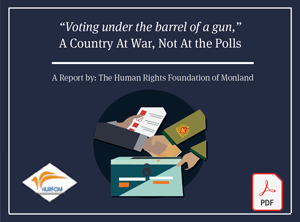Flooding in Bangkok Leads to Factory Closures in Three Pagoda Pass
November 15, 2011
HURFOM: Severe flooding in Thailand’s central region has led to the closure of several factories in Three Pagodas Pass, leaving an estimated 1,000 Burmese migrant workers without work. Many are facing difficulties in the absence of their daily wages while waiting for the factories to re-open. But factory owners have yet to say when operations will resume.
 So far, at least ten factories in Three Pagodas Pass have shut their doors since October 21st. One Burmese migrant worker from Monsimar glove factory told HURFOM there were over 10 factories on the Thai side temporarily closed because, as the managers explained that raw materials could not be transported from their main factories.
So far, at least ten factories in Three Pagodas Pass have shut their doors since October 21st. One Burmese migrant worker from Monsimar glove factory told HURFOM there were over 10 factories on the Thai side temporarily closed because, as the managers explained that raw materials could not be transported from their main factories.
Although some factories still pay their employees daily wages, some are not. As a result, a large number of Burmese workers are struggling to survive.
Ma Khaing Wai [not real name],22, a worker at Sarkawar shoe factory, said, “I don’t know when the factory will open again. And, the manger does not tell us about that, either. Now, we have to spend our last month’s wage on ourselves instead of sending it to our families. If the factory doesn’t re-open in the next couple weeks, I think I’d better look for another job to pay for my daily meals. But I know it’s not easy to find another job.”
Three Pagodas Pass is a small business zone where many Thai businessmen have invested in factories that employ low-wage workers from Burma. However, if the factory closures persist, migrant factory workers might have to return to Burma.
May May Hlaing [not real name] is 19 and has been employed in a shoe factory for the last year. She said if her factory continues to be closed, she’ll go back to Burma: “Normally, I get 90 baht (3 USD) per day and 14 baht (0.25 USD) per hour for overtime. I usually work 3 hours overtime each day. Now, I am staying with my aunt’s family, and I have to pay her 1,200 Baht for food and accommodation. So if the factories stay closed, it’s better to go back to my hometown.”
According to a HURFOM field reporter, six factories in Three Pagodas Pass have re-opened since November 9th, whereas 4 factories, which employ about 600 Burmese workers, remain closed.
Although Three Pagodas Pass was famous for its border trade after 1988, in 2006 the State Peace and Development Council (SPDC) of Burma decided to ban imports entering from Three Pagodas Pass as well as not to export through it. As a result, the job opportunities on the Burma side of the border vanished, leaving most workers to seek employment on the Thai side. Nowadays, many from the Burma side earn their living in Thai factories producing textiles, sockets, underwear, wigs, and shoes.
Comments
Got something to say?
You must be logged in to post a comment.




















































